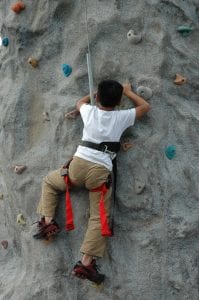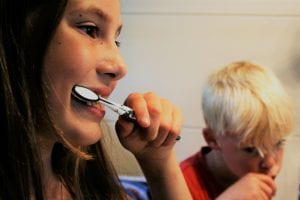“I believe that every child is persistent in whatever task they care about and are interested in.”
An interview with Julia Leonard, PhD
Post-doctoral Fellow, MindCORE, UPenn
By Michelle Johnson (January 24, 2019)
What did you want to be when you were a kid? Were you always interested in science?
I wanted to be many things: a clown, a professional figure skater, an artist, a dentist. I was always interested in science, especially the natural world. I was the kind of kid who would go out into the yard and “study” and “experiment” with ants and spiders for hours. But I also was, and still am, interested in many things beyond science– I’m just extremely curious.
What questions are on your mind right now?
The main questions that drive my research are 1) what factors impact people’s decisions to persist through challenges and 2) why do people decide to take on challenges in the first place? These questions are obviously relevant for adults, but I’m most interested in exploring them in young children, before they enter formal schooling. I hope that understanding how children make decisions related to effort early in life will inform interventions that help put kids on the path towards successful learning by the time they enter school.
 I’m also interested in understanding children’s dynamic range of persistent behavior and exploring what factors make each individual child be more like the best or worst version of themselves. When I tell people about my research, a lot of them ask me, “Do you think that some people are just more persistent than others at everything?” Sure, some people might be ‘grittier’ than others across the board, but I believe that every child is persistent in whatever task they care about and are interested in. I also think some local transient factors, like sleep and a parent’s mood, might really impact children’s persistence in any given moment. I’m quite optimistic about tapping into each individual’s potential to try hard and tackle challenges, it’s just a matter of figuring out how to do that and this is a question that is driving a lot of my current research.
I’m also interested in understanding children’s dynamic range of persistent behavior and exploring what factors make each individual child be more like the best or worst version of themselves. When I tell people about my research, a lot of them ask me, “Do you think that some people are just more persistent than others at everything?” Sure, some people might be ‘grittier’ than others across the board, but I believe that every child is persistent in whatever task they care about and are interested in. I also think some local transient factors, like sleep and a parent’s mood, might really impact children’s persistence in any given moment. I’m quite optimistic about tapping into each individual’s potential to try hard and tackle challenges, it’s just a matter of figuring out how to do that and this is a question that is driving a lot of my current research.
What might a dream interdisciplinary collaboration look like for you?
I have two dream collaborations right now. The first is to work more closely with teachers. As a researcher working on problems that pertain to education, I have a lot to learn from what teachers already know. My best friend is a local elementary school teacher in Philly and conversations with her have led to some of my best scientific insights. I would like to work more closely with local teachers to both hear their thoughts on the development of persistence and motivation broadly, and also to plan some collaborative classroom-based studies together.
My second dream collaboration is with pediatric dentists and professionals in public health. This might sound totally unrelated to my research, but during my post-doc with Allyson Mackey we are trying to work on problems  related to “real world” persistence. We have decided to focus on teeth brushing in 3-year-olds – a skill they are still developing that requires persistence. We are trying to understand how much teeth brushing behavior changes day to day and what factors contribute to that variation. Thinking back to the first question you asked me about my childhood dreams, I think my childhood-self would be happy I’m doing something vaguely related to dentistry!
related to “real world” persistence. We have decided to focus on teeth brushing in 3-year-olds – a skill they are still developing that requires persistence. We are trying to understand how much teeth brushing behavior changes day to day and what factors contribute to that variation. Thinking back to the first question you asked me about my childhood dreams, I think my childhood-self would be happy I’m doing something vaguely related to dentistry!
In studying perseverance, what have you discovered about your own motivation?
For me, it’s all about relationships. The main reason I chose to come to Penn was to work with Dr. Allyson Mackey. Allyson is one of those rare people who continues to inspire me both intellectually and personally. I learn from her in the lab, but also through her generous actions and composure as a mother, advisor, and friend. My deep respect and admiration for Allyson motivate me to work hard and give her strong material to work with.
What’s the best piece of advice you’ve ever received?
Find a good mentor. Science, and life really, is full of challenges. The reason I’m still in science is because I’ve had such amazing mentors who I really look up to, who have had faith in me, and have helped me immensely along this journey.
To learn more about Dr. Leonard and her work, click here.
Click here to go back to the “Interviews with Scientists” page.
